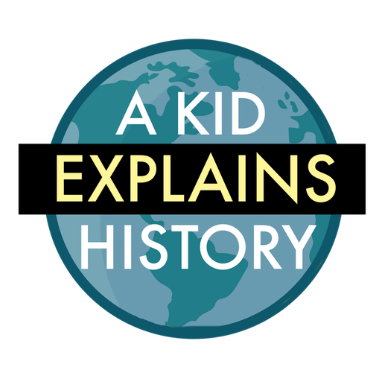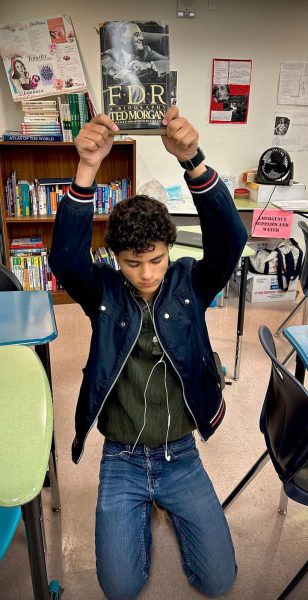Walking into his history class on the first day of school, Quinn Hutchison could feel every pair of eyes turn to him.
“You look really familiar…” one student tells him as he passes.
“Well,” he responds, “You just might have seen me before.”
A rising senior at Valley International Preparatory High School, Hutchison is well known, not just in his classes, but across the country.
Known for his YouTube channel, “A Kid Explains History”, currently sitting at close to 30,000 subscribers, Hutchison spends his afternoons breaking down history for young students.

“One of my favorite things about the channel is the fact that I have made such an impact,” he said. “People watch my videos across the country. I never thought about the channel like that. When I was younger, it was just something I did for fun. But now its hitting me, I entered the world of Gen-Z education.”
The original idea for his YouTube channel started when he was only eight years old.
“When I was eight, I asked my dad if I could start a channel, and he said ‘sure, but not on gaming. What else are you interested in?’,” he said. “I jokingly picked history. But the older I got, the more personal and deep my connection to history became.”
Even as he’s grown up, he continues, and hopes to continue with, “A Kid Explains History”
“I love doing the channel,” he said. “It keeps me occupied. Even when I get really busy I make time for it. I hope to keep doing it after I graduate, after I’m no longer ‘a kid explaining history,’”
Now, Hutchison could be described as a history fanatic.
“If you say any number between 1-46, I can tell you who the president was,” he said. “If you name any election year, I can tell you who ran, who won and what happened.”
When tested on his trick, he really was able to name every fact and side-story there ever was, for any year in American Politics.
Which leaves people wondering, how did he ever learn all of this?
““I never really studied to learn all of this,” he said. “I just read and watch videos. I never realized I had all of these skills until about a year ago. Somebody asked me to name all of the presidents in order, and I did it, and I realized I could. And soon after I started to test myself. Now it’s just a party trick.”
But Hutchison doesn’t spend his days just making videos.
“When I got into high school, I started speech and debate,” he said. “I just recently went to states, and I won fifth place for extemporaneous speaking, which is basically giving a speech with 30 minutes of prep time.”
Additionally, Hutchison extends his historical knowledge via an alternate history story titled Triple Calamity.
“Triple Calamity is basically a story retelling history, but without ever having Lincoln, Johnson and Stewart die. It’s a good brain teaser.”
And just in case he wasn’t busy enough, Hutchison helps to run CivicStars, a non-profit started by Jared Gonzalez and Van Nuys Student Dwayne Famenia.
“CivicStars is a new organization that aims to teach civics to the youth of Los Angeles. Whether it be politics or history, the goal is just to teach and prepare young students for the future”
As Americans look ahead to the future of the country this election season, the fate seems grim.
But Hutchison believes that American politics are a complex system that young people could completely change.
“There’s a big thing in American Polictical history,” he said. “Young people, if they had voted, could change most elections, probably for the better.”
His passion for young voters and historical knowledge have led to his joining of CivicStars.
“Young people do not vote. They just don’t. Currently, you can not get them to. Politicians will beg for young people to vote, but they just don’t care. ‘Oh it’s an election year?,’ they’ll say. ‘Ok… but Stacy’s throwing this party down the street so…’ and that’s it. People like to blame a presidential loss on the fact that young people didn’t vote for them, but the fact is, they wern’t voting for anyone in the first place.
And although he’s too young to vote right now, Hutchison has goals to continue in a path that will allow him to use his knowledge and spread awareness about causes he’s passionate about.
“When I go to college I wanna major in poli-sci, maybe history as well,” he said. “I want to leave a path open, I don’t want to commit this young.”
With a degree in History, one typically goes into education. But Hutchison is unsure if education is the right path for him.

“I like education,” he said. “I like the idea of education. I think I would be a pretty good history teacher, but I don’t want to stand in front of kids, or even high schoolers. So if I did anything in education, I would be a professor.”
But one thing he does know is that he won’t be majoring in math.
“Math is just annoying,” he said. “I sit down, and I just don’t want to be there. It doesn’t excite me. And I know most people don’t think history is the most exciting, but I think there’s a fundamental difference. And I’m sure I would be better at math if I applied myself, but I just don’t really care, so I don’t really care to try”
While Hutchison believes math is as boring as could be, he finds what some might consider a boring subject, history, specifically American History, more interesting than anything.
“My specialty is American History, but I like everything, especially politics and political history,” he said. “I try and be as well-versed in everything, but I find American History the most interesting, and the easiest to study.”
For those reading who can’t fathom being this interested in anything, let alone dates and names from hundred of years ago, Hutchison encourages you to research your own history, and learn how you fit into everything.
“When it comes down to it, history is like a very large tangled forest,” he said. “Each tree is a date or event, and from the center, you just want to get out of the forest. But if you go above the trees, you can see how they all connect. The best way to enjoy history is to find how you’re connected to it. History is always about connection.”
The best way to start forming these connections, he says, is to start at something small and niche you really enjoy, and branch out from there.
“Take a musical artist you really like for example, and learn everything about them,” he said. “Then pull back and see how they effect society. Then see how people interpret them. I think if you’re interested in people or in psychology, you have to be interested in history, because that’s what history is. Looking at people and choices and what led people to make what choices.”


